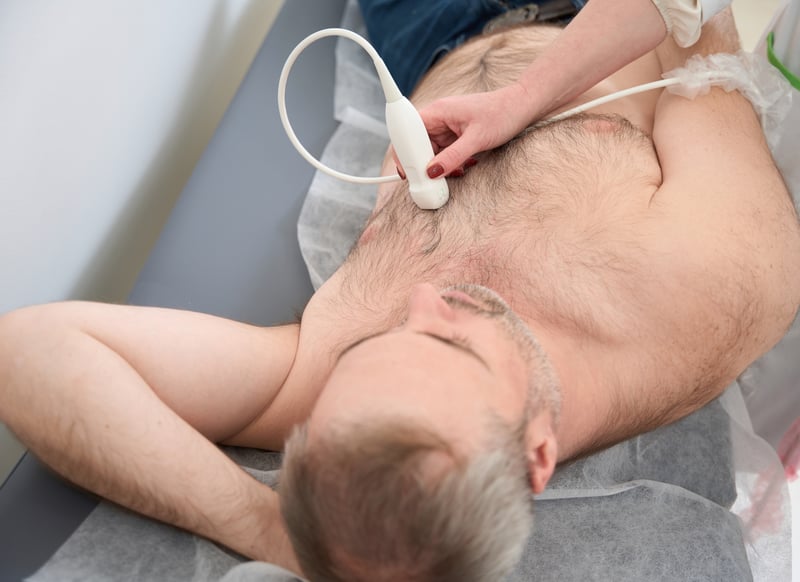Manténgase sano!

- Denise Mann
- Posted April 5, 2023
AI Beats Trained Staff in Spotting Heart Trouble on Sonograms
It's machine: 1, man: 0 in the latest battle between artificial intelligence (AI) technology and human health care pros.
This time researchers set out to see if cardiologists could tell the difference between AI and a sonographer's assessments of a key measure of heart health on ultrasound images.
Spoiler alert: They couldn't.
"This is a machine beats man situation,"said study author Dr. David Ouyang, a cardiologist at the Smidt Heart Institute and the Division of Artificial Intelligence in Medicine at Cedars-Sinai in Los Angeles.
An echocardiogram uses sound waves to capture images of a beating heart.
One measure it captures is left ventricular ejection fraction, which reflects how much blood the heart's left ventricle pumps out with each contraction. Ultrasound technicians must calculate this percentage after taking the images. AI learns by combining massive amounts of data with rules called algorithms to find patterns that aid decision-making.
For the study, cardiologists reviewed left ventricular ejection fraction measurements on nearly 3,500 echocardiogram images. They didn't know whether the measurement was calculated by AI or a sonographer.
Cardiologists agreed with AI's initial assessment more often than with the sonographer's. What's more, cardiologists couldn't tell which assessments were made by AI and which were done by sonographers.
This doesn't mean that computers will take the place of ultrasound technicians, Ouyang said. AI technology just makes the process more efficient.
Sonographers scan the heart, get the images and have less tedious computer work afterward, he said.
"AI doesn't change the cardiologist's role, it makes the sonographer work faster and more efficiently, and it doesn't change the patient experience,"Ouyang said. "It's a triple win."
Now, Ouyang and his colleagues are looking to get U.S. Food and Drug Administration approval for this AI app.
The study was published April 5 in Nature.
Outside experts agree that AI is here to stay and the future is now.
Calling this a "really nice and very important study,"Dr. Patricia Pellikka said anything that can improve the efficiency of a sonographer's job is worth it. She is a cardiologist, echocardiographer and director of the Echocardiography Laboratory at the Mayo Clinic in Rochester, Minn.
"It is a physically demanding job with a lot of arm and wrist stress, so if some small part of the exam can be done by a machine, it would go a long way,"Pellikka said.
In many parts of the country, there are long waits to see sonographers, Pellikka noted.
"This AI technology would also benefit new and less experienced sonographers,"she added.
When it comes to the role that AI will play in cardiology and medicine as a whole, this is just the beginning. Pellikka helped develop an FDA-approved AI model that aids in diagnosing heart failure with preserved ejection fraction (HFpEF), which occurs when the heart pumps blood normally but is too stiff to fill properly.
"This has always been a difficult diagnosis as the symptoms are non-specific,"she said.
AI is exploding, Pellikka said.
"There are many ways you can apply AI to echocardiograms, including measurements, diagnoses or even to guide ... inexperienced people to get the best images,"she said.
Dr. Theodore Abraham agreed. He is a professor of medicine at the University of California, San Francisco and vice president of the American Society of Echocardiography.
"AI has significant potential to support image-based diagnostic modalities such as ultrasound," he said. "Hence, I see this as an enabling technology for sonographers and cardiologists."
In cardiac ultrasound, sonographers and heart specialists perform several tasks that involve recognition of structures and their borders, Abraham pointed out.
"These tasks can be substantially optimized using AI technologies leading to improved workflow efficiency, reduced burnout and more consistency in measurements," he said.
Dr. Deborah Kwon, cardiac MRI director at the Cleveland Clinic, said the tool may help standardize the quality of image interpretation, given differences in training and expertise among newer sonographers.
That's not to say that all AI technology is ready for prime time, she noted.
"AI can only be as good as the data that it is given, and we can't be sure what exactly AI is using to learn,"Kwon said.
In other words, there will always be a need for human oversight to ensure quality and safety, she said.
"I believe and hope that machines can take all the computational tasks and tedious burdens to enable humans to do what we do best -- create, innovate, connect and heal,"Kwon said.
More information
The Mayo Clinic more on using AI in cardiology.
SOURCES: David Ouyang, MD, cardiologist, Smidt Heart Institute, division, artificial intelligence in medicine, Cedars-Sinai, Los Angeles; Patricia Pellikka, MD, cardiologist, echocardiographer, director, Echocardiography Laboratory, Mayo Clinic, Rochester Minn.; Theodore Abraham, MD, professor, medicine, University of California San Francisco, and vice president, American Society of Echocardiography; Deborah Kwon, MD, director, Cardiac MRI, Cleveland Clinic, Ohio; Nature, April 5, 2023

